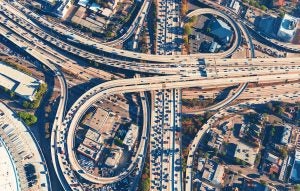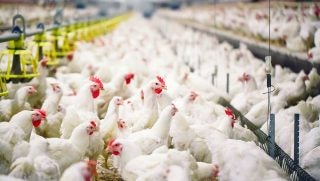Sprawling skyscrapers requiring electricity and gas, a polluted, smog-filled skyline, insanely congested highways full of GHG-emitting vehicles, and crowded living spaces amid a bustling, seemingly never restful, city.
Does reading this make Los Angeles come to mind? If it’s not your first choice, it’s almost certainly in your Top 5.
Imagine being a city that has one of the largest carbon footprints in the world and that continues to eat up the arable land in its path — and then blames its environmental issues on animal agriculture.
The Los Angeles City Council voted unanimously to adopt a resolution in support of the global Plant Based Treaty initiative, which targets animal agriculture practices.
This is hardly shocking for a big city such as Los Angeles, but still perplexing considering the carbon footprint large cities have on the environment. Yet it seems animal agriculture is always the scapegoat in policy talks.

Consider the Global Gridded Model of Carbon Footprints statement that 100 cities, with Los Angeles being in the top 5, drive 18 percent of global emissions.
To preface specific details on the initiative, here is some pertinent information regarding the production of greenhouse gasses globally: carbon dioxide from fossil fuels and industrial processes (65 percent), carbon dioxide from forestry and other land use (11 percent), methane (16 percent), nitrous oxide (6 percent) and F-gasses (2 percent).
Broken down by the economic sector, electricity and heat production (25 percent), industry-primarily fossil fuels burned for energy (21 percent), agriculture, forestry and other land use (24 percent), and transportation (14 percent) are the biggest contributors to the aforementioned gasses. It’s important to note that agricultural ecosystems can then go on to remove CO2 from the atmosphere by sequestering carbon and offsets 20 percent of the 24 percent total emissions from this sector.
The treaty isn’t concerning because it is trying to promote more consumption of plant-based foods, rather, its entire principle is hypocritical.
The three core principles of the treaty are to:
- Relinquish — No land use change, ecosystem degradation or deforestation for animal agriculture
- Redirect — An active transition away from animal-based food systems to plant-based systems
- Restore — Actively restoring key ecosystems, particularly restoring forests and rewilding landscapes.
According to a news release, the Plant Based Treaty is seeking a global movement that will focus on each of the following items:
- Halt the global expansion of deforestation attributed to animal agriculture
- Incentivize a plant-based food system
- Encourage public information campaigns about the benefits of plant-based foods
- Free up land and waters to rewild, reforest and restore the Earth’s oceans
- Allow a just transition to more sustainable jobs, healthier people and a thriving planet
How can a city that is constantly increasing its urban sprawl in order to accommodate millions of residents and a massive entertainment industry target animal agriculture for land-use change and ecosystem degradation?
In California, more than 500,000 acres of land have been lost to industry and housing in the past decade, according to the California Rangeland Trust. This land could be used for wildlife habitats, more sustainable land use like grazing land, or even arable land to help grow the food we need to feed growing populations.
In terms of grazing land specifically, there are major ecosystem services benefits. This includes, but isn’t limited to, medicinal resources, cleaner air and water, pollination, climate regulation, and biodiversity maintenance. In order to restore key ecosystems, such as forests, grazing animals help to prevent severe wildfire damage by grazing down fire fuels like shrubs, and reducing fuel loads. Public land partnerships with livestock owners are mutually beneficial as they help manage noxious plants and allow animals to work in harmony with nature, upcycling otherwise wasted nutrients in order to provide all-natural byproducts humans use every single day.
While deforestation is certainly an issue, it isn’t one that is as black and white as this treaty makes it seem. In the United States, deforestation was a concern a century ago, and our country responded by establishing national forests and grasslands and more governmental management on private and public lands.
Now, though, our main concern isn’t deforestation, especially not at the hands of animal agriculture. Wildfires (due to mismanaged lands and the increase of fire fuel loads due to lack of grazing and controlled burns), droughts, and invasive species are all major issues in our forests. Animal agriculture, and maybe some policy changes with water storage and use, could help solve our forest concerns.
Lastly, there is a major issue with the last bullet point, stating a “transition to more sustainable jobs, healthier people and a thriving planet.” The Dietary Guidelines specifically promote animal-based proteins as part of a complete diet. A healthy, balanced diet is the key to healthier people. One could argue that food waste by humans is one of the largest contributors to GHG emissions, and animal agriculture plays a key role in reducing waste that humans create, i.e., feeding food byproducts to animals instead of sending it straight to landfills.
Ignoring the fact that cities can have negative health impacts on the body, like higher cardiovascular disease and respiratory disease, while blaming animal agriculture for the world’s woes, is hypocritical. While those living in cities with access to quality housing and green space are seen to benefit the most, it would be naïve to believe that a city with a major housing crisis offers a lot in that aspect. Let’s not forget that rangelands and farms, where employees are working outside, can be more beneficial than a 9-5 office job sitting at a desk all day.
If Los Angeles wants a thriving planet, they should look in the mirror instead of casting blame on an industry that provides food, clean air and water, and many other ecosystem benefits for its residents.
Markie Hageman majored in agribusiness at Fort Hays State University. She is actively involved in her state Cattlemen’s Association, Young Farmers chapter, and National Cattlemen’s Beef Association. Her AGDAILY.com articles can be found here.



